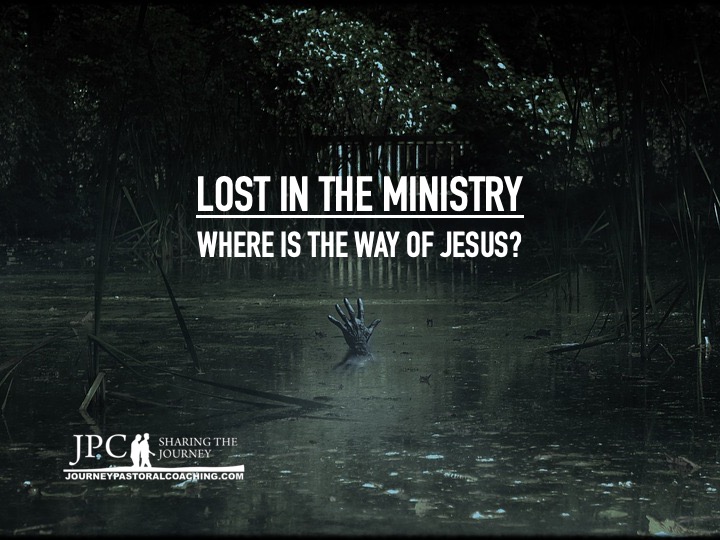I am a pastoral coach. For over ten years, I have invested my life in walking with young pastors across America and overseas.
In general, I love what I do and consider it the greatest privilege and joy of my more than four decades in ministry as a pastor and missionary.
However, like any pastor or missionary, there are aspects of my ministry that are difficult.
Painfully so.
“I have said these things to you, that in me you may have peace. In the world you will have tribulation. But take heart; I have overcome the world.” John 16.33
As a pastoral coach, it is hard to watch a minister of the Gospel kill themself, slowly strangle their soul by neglecting to live in The Way of Jesus. Running furiously, occupied so intensely with working for God, they have removed themself from the working of God in their own life.
One day, too late and agonizingly broken, they will ask God why, even then still not understanding that their brokenness was self-inflicted. Busy working for God, they make no room for the work of God in their own lives.
And so, their way is not easy. Their burden is not light.
“So Jesus said to them again, “Peace be to you; just as the Father has sent Me, I also send you.” John 20.21
Men and women of God, we cannot work against The Way of Jesus while doing the Work of Jesus. Not if we long to experience the abundant life He promised. To do so is to work against God and our formation. Eventually, it will crush our soul to dust, even as we preach the promise of Jesus that says:
“If anyone thirsts, let him come to Me and drink. He who believes in Me, as the Scripture has said, out of his heart will flow rivers of living water.” John 7.37-38
The Way of Jesus is living. Minister of the Gospel, are you living? Are you fully alive in Jesus? Are you fully alive in Jesus as you go about the Work of Jesus?
Or are you dying, your soul silently shriveling?
Too distracted to feast daily on the Word and prayer?
Too diverted to say no to endless activity?
Too self-absorbed to know it doesn’t all depend on you?
Too self-focused to be a Paul who needs a Barnabas, a Barnabas who has time for a Paul?
“Come to Me, all who are weary and burdened, and I will give you rest.” Matthew 11.28
A few years ago, a man I knew became ill. Pressed by his wife, family, and friends to see a doctor, he told them he was too busy; there was too much in life that required his immediate attention: “I’ll do what I need to do when I can get some time.”
He’s lying in the ground today. No more time. Too many years before his time.
One simple question, minister of the Good News of Jesus: are you walking in The Way of Jesus? Yes or No? No excuses, just an honest Yes or No?
If yes, you have momentum, so go deeper. Focus on your soul as if your life depends on it, for, in fact, it does.
If no, stop your death march; turn to The Way of Jesus: The Way of the burden that is light, The Way that leads to Peace, The Way that leads to Life.
Minister of the Gospel, don’t make us mourners of the person you are.
Don’t make us mourners of the person you could have been.
If you’re not sure what to do, reach out to us here at Journey Pastoral Coaching or call a more mature minister you respect. Don’t live one more day outside The Way that leads to life.
“Peace I leave with you; my peace I give to you. Not as the world gives do I give to you. Let not your hearts be troubled, neither let them be afraid.” John 14.27
————
NOTE: Journey Pastoral Coaching exists to provide pastoral coaching to Millennial ministers.
Saddled with large student debt, just beginning to set up homes and start families, and serving in low paying first and second positions, Millennials are those who most desire but can least afford to pay for pastoral coaching.
We are able to do so thanks to the faithful and generous support of individuals and churches like yours who want to see young leaders not only enter the ministry, but remain in the ministry.
Now, more than ever, we need your help.
If you or your church would like to help Millennial ministers across the US and overseas build strong for a lifetime in ministry, please click here to support Journey monthly or with your one-time gift. Thank you.
We also invite you to click and subscribe to our twice-monthly blogs at journeypastoralcoaching.com
“Of all vocations, surely the gospel ministry is the one whose paradigm is most radically formed by the dynamics of godly mentorship.”
Stephen Baldwin
Recent Tweets
JPC Instagram
© [2015] — Journey Pastoral Coaching



